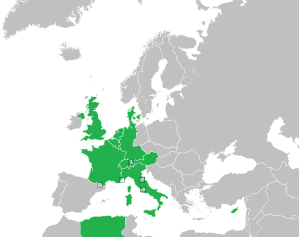Eurovision Song Contest 1957
The Eurovision Song Contest 1957 was the second edition of the annual Eurovision Song Contest. It took place in Frankfurt-am-Main, West Germany and was held at the Großer Sendesaal des hessischen Rundfunks on Sunday 3 March 1957. The show was hosted by German actress Anaid Iplicjian. Like the first edition of the contest, this one was still mainly a radio programme, but there was a noticeable increase in the number of people with televisions.
| Eurovision Song Contest 1957 | |
|---|---|
 | |
| Dates | |
| Final | 3 March 1957 |
| Host | |
| Venue | Großer Sendesaal des hessischen Rundfunks Frankfurt-am-Main, West Germany |
| Presenter(s) | Anaid Iplicjian |
| Conductor | Willy Berking |
| Executive supervisor | Rolf Liebermann |
| Host broadcaster | Arbeitsgemeinschaft der öffentlich-rechtlichen Rundfunkanstalten der Bundesrepublik Deutschland (ARD) |
| Website | eurovision |
| Participants | |
| Number of entries | 10 |
| Debuting countries | |
| Non-returning countries | None |
Participation map
| |
| Vote | |
| Voting system | Ten-member juries distributed 10 points among their favourite songs. |
| Nul points | None |
| Winning song | "Net als toen" |
The winner was the Netherlands with the song "Net als toen", performed by Corry Brokken,[1] written by Willy van Hemert and composed by Guus Jansen. This was the Netherlands' first victory in the contest.
For some time, a rumour had existed that the privilege of hosting the 1957 contest was given to Germany because they had come in second place in 1956 with "Im Wartesaal zum großen Glück" by Walter Andreas Schwarz. In fact, not only were the official 1956 scores withheld, but the rule stating that the winning nation hosts the next year's Eurovision Song Contest had not yet been conceived. It was planned at the time that each participating country would take it in turns to host the event. However, as more countries wished to participate, this became impractical.[1]
Location
The contest took place in Frankfurt, one of the largest cities in, at the time West Germany. The host venue was the Großer Sendesaal des Hessischen Rundfunks, a building, music hall and former television studio based in Frankfurt am Main. Today it is used as a music hall.[2][3]
After being devastated in the Second World War during the early 1940s, Frankfurt rebuilt itself well into the 1950s into one of Europe's most prominent financial centres. With investments coming in from both national and international financial institutions, 1957, the year of the contest, already saw the first of Frankfurt's high-rise business buildings.[4][5]
Format
In this year's contest the Italian entry lasted for 5:09 minutes, whilst the UK's entry lasted for only 1:52 minutes. It was because of songs like the former that a rule was eventually introduced restricting each song to a maximum of 3 minutes; this rule still applies.[1]
In a change of rules from the previous year's contest, duos were allowed to compete. Danish representatives, Birthe Wilke and Gustav Winckler, were the first of such acts to participate under this rule change. At the end of their performance, the couple exchanged the longest kiss in the contest's history, although only people with televisions could actually see it. This was due to a member of the production staff forgetting to give a pre-arranged sign that the kiss should end.[1]
This was the first year where the juries were contacted by telephone. It was also the first time the Netherlands won the contest. Another notable change was that the national juries could not vote for their own song, a rule which would be continued throughout the contest's subsequent history.[1]
Participating countries
Belgium, France, Germany, Italy, Luxembourg, Netherlands, and Switzerland made their second appearances following their débuts in 1956. Austria and Denmark made their débuts; these countries had wanted to participate in 1956, but had applied to the European Broadcasting Union after the deadline for song submissions for that year's contest had passed, thus missing it. With those joining in 1957, the total number of countries was ten, three more than in the first ever contest.[1]
It was thought that the United Kingdom had also missed the participation deadline for the 1956 contest, but the EBU revealed in January 2017 that this was unfounded speculation spread by fans of the contest.[6] The EBU further went on to explain that the "Festival of British Popular Song", a contest created by the BBC for the United Kingdom, was the inspiration that brought in changes to the contest format from 1957.[6]
Conductors
Each performance had a conductor who conducted the orchestra.[7][8]
.svg.png)









Returning artists
The contest saw the return of two artists who had participated in the previous edition of the contest - Corry Brokken for Netherlands, and Lys Assia for Switzerland.[1]
Results
| Draw | Country | Artist | Song | Language[9] | Place[10] | Points |
|---|---|---|---|---|---|---|
| 01 | Bobbejaan Schoepen | "Straatdeuntje" | Dutch | 8 | 5 | |
| 02 | Danièle Dupré | "Amours mortes (tant de peine)" | French | 4 | 8 | |
| 03 | Patricia Bredin | "All" | English | 7 | 6 | |
| 04 | Nunzio Gallo | "Corde della mia chitarra" | Italian | 6 | 7 | |
| 05 | Bob Martin | "Wohin, kleines Pony?" | German | 10 | 3 | |
| 06 | Corry Brokken | "Net als toen" | Dutch | 1 | 31 | |
| 07 | Margot Hielscher | "Telefon, Telefon" | German | 4 | 8 | |
| 08 | Paule Desjardins | "La belle amour" | French | 2 | 17 | |
| 09 | Birthe Wilke & Gustav Winckler | "Skibet skal sejle i nat" | Danish | 3 | 10 | |
| 10 | Lys Assia | "L'enfant que j'étais" | French | 8 | 5 |
Scoreboard
| Voting results | ||||||||||||
|---|---|---|---|---|---|---|---|---|---|---|---|---|
| Belgium | 5 | 1 | 2 | 2 | ||||||||
| Luxembourg | 8 | 3 | 4 | 1 | ||||||||
| United Kingdom | 6 | 2 | 1 | 1 | 1 | 1 | ||||||
| Italy | 7 | 1 | 2 | 2 | 1 | 1 | ||||||
| Austria | 3 | 1 | 2 | |||||||||
| Netherlands | 31 | 7 | 3 | 4 | 1 | 6 | 1 | 1 | 3 | 5 | ||
| Germany | 8 | 6 | 1 | 1 | ||||||||
| France | 17 | 2 | 6 | 1 | 2 | 4 | 2 | |||||
| Denmark | 10 | 5 | 3 | 2 | ||||||||
| Switzerland | 5 | 2 | 1 | 1 | 1 | |||||||
Broadcasters, commentators and spokespersons
Spokespersons
Listed below is the order in which votes were cast during the 1957 contest along with the spokesperson who was responsible for announcing the votes for their respective country.[11]









.svg.png)
Broadcasters and commentators
Each national broadcaster also sent a commentator to the contest, in order to provide coverage of the contest in their own native language.
| Country | Broadcaster(s) | Commentator(s) | Ref(s) |
|---|---|---|---|
| ORF | No commentator | [11] | |
| INR | French: Janine Lambotte | [11] | |
| NIR | Dutch: Nic Bal | [11] | |
| Statsradiofonien TV | Gunnar Hansen | [11] | |
| RTF | Robert Beauvais | [11] | |
| Deutsches Fernsehen | Wolf Mittler | [11] | |
| Programma Nazionale | Bianca Maria Piccinino | [11] | |
| Télé-Luxembourg | Jacques Navadic | [11] | |
| NTS | Piet te Nuyl | [11] | |
| TSR | Georges Hardy | [11] | |
| BBC Television Service | Berkeley Smith | [11][8] | |
| BBC Light Programme | Tom Sloan | [11] |
References
- "Eurovision Song Contest 1957". EBU. Retrieved 11 June 2012.
- "Location database - Großer Sendesaal des hessischen Rundfunks". film-commission-hessen.de. Archived from the original on 1 May 2013. Retrieved 12 June 2012.
- "Die singende Richterin: Corry Brokken" (in German). Eurovision.de. Retrieved 12 June 2012.
- "Reconstruction and the "Frankfurter Principle"". Messe Frankfurt. Archived from the original on 27 May 2014. Retrieved 20 October 2012.
- "Frankfurt City History". Tourist Information Offices Frankfurt. Archived from the original on 14 September 2013. Retrieved 20 October 2012.
- Jordan, Paul (11 January 2017). "Shining a light on the United Kingdom: 60 Years at Eurovision". eurovision.tv. European Broadcasting Union. Retrieved 13 January 2017.
Contrary to popular fan myths, the UK did not intend to enter in 1956 as the BBC had previously created their own separate contest, the Festival Of British Popular Songs
- "And the conductor is..." Retrieved 10 July 2018.
- Roxburgh, Gordon (2012). Songs for Europe: The United Kingdom at the Eurovision Song Contest. Volume One: The 1950s and 1960s. Prestatyn: Telos Publishing. pp. 152–159. ISBN 978-1-84583-065-6.
- "Eurovision Song Contest 1957". The Diggiloo Thrush. Retrieved 4 March 2012.
- "Scoreboard results". Eurovision Song Contest 1957. EBU. Retrieved 11 June 2012.
- "Eurovision 1957 Cast and Crew". IMBD. IMDb. Retrieved 17 July 2020.

